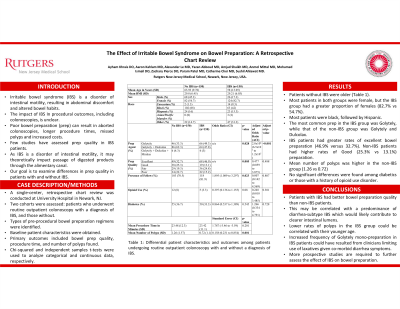Monday Poster Session
Category: Functional Bowel Disease
P1949 - The Effect of Irritable Bowel Syndrome on Bowel Preparation: A Retrospective Chart Review
Monday, October 23, 2023
10:30 AM - 4:15 PM PT
Location: Exhibit Hall

Has Audio

Ayham Khrais, DO
Rutgers New Jersey Medical School
Newark, New Jersey
Presenting Author(s)
Ayham Khrais, DO1, Aaron Kahlam, MD1, Alexander Le, MD1, Yazan Abboud, MD1, Amjad Shaikh, MD1, Anmol Mittal, MD1, Mohamed Ismail, DO1, Zachary Pierce, DO1, Param Patel, MD1, Catherine Choi, MD1, Sushil Ahlawat, MD2
1Rutgers New Jersey Medical School, Newark, NJ; 2SUNY Downstate Health Sciences University, Brooklyn, NY
Introduction: Irritable bowel syndrome (IBS) is a disorder of intestinal motility, resulting in abdominal discomfort and altered bowel habits. While it can significantly impact patients’ lives, it has an unclear impact on clinical and procedural outcomes, including colonoscopies. Poor prep can result in aborted colonoscopies, longer procedure times, missed polyps and increased costs. Few studies have examined the quality of prep in patients with IBS, despite it being a disorder of intestinal motility that may theoretically impact passage of prep through the bowel. Our goal is to examine differences in quality of bowel prep in patients with and without IBS.
Methods: A retrospective chart review from a single center was conducted at University Hospital in Newark, NJ, examining patients who underwent colonoscopy with and without a diagnosis of IBS. Procedure reports were used to identify outcomes (bowel preparation quality, procedure time, number of polyps found). Type of bowel prep was identified. Baseline characteristics, including age, sex at birth and ethnicity were obtained. Chi-squared and independent samples t-tests were used to analyze categorical and continuous data respectively. Multiple logistic regression was used to control for confounders.
Results: Patients without IBS were older. Most patients in both groups were female, but the IBS group had a greater proportion of females (82.7% versus 54.7%). Most patients were Black, followed by Hispanic. In terms of primary outcomes, differential rates of preparation agent use, preparation quality, and polyp numbers were statistically significant. Patients with IBS had fewer detected polyps on average (0.72 versus 1.26). Rates of preparation agent use differed among both groups: non-IBS patients were mostly given Golytely + Dulcolax (62.3%), followed by Golytely (33.3%). IBS patients were mostly given Golytely (49.3%), followed by Golytely + Dulcolax (47.8%). Preparation quality differed among both groups, with IBS patients having greater frequency of excellent preparation than their counterparts.
Discussion: Patients with IBS had better preparation quality which may be correlated with their younger age as they are at a reduced risk for colonic polyps as opposed to their older counterparts. IBS patients had less extensive preparations, possible due to IBS-associated symptoms. A large prospective study should be conducted for further results.
Disclosures:
Ayham Khrais, DO1, Aaron Kahlam, MD1, Alexander Le, MD1, Yazan Abboud, MD1, Amjad Shaikh, MD1, Anmol Mittal, MD1, Mohamed Ismail, DO1, Zachary Pierce, DO1, Param Patel, MD1, Catherine Choi, MD1, Sushil Ahlawat, MD2. P1949 - The Effect of Irritable Bowel Syndrome on Bowel Preparation: A Retrospective Chart Review, ACG 2023 Annual Scientific Meeting Abstracts. Vancouver, BC, Canada: American College of Gastroenterology.
1Rutgers New Jersey Medical School, Newark, NJ; 2SUNY Downstate Health Sciences University, Brooklyn, NY
Introduction: Irritable bowel syndrome (IBS) is a disorder of intestinal motility, resulting in abdominal discomfort and altered bowel habits. While it can significantly impact patients’ lives, it has an unclear impact on clinical and procedural outcomes, including colonoscopies. Poor prep can result in aborted colonoscopies, longer procedure times, missed polyps and increased costs. Few studies have examined the quality of prep in patients with IBS, despite it being a disorder of intestinal motility that may theoretically impact passage of prep through the bowel. Our goal is to examine differences in quality of bowel prep in patients with and without IBS.
Methods: A retrospective chart review from a single center was conducted at University Hospital in Newark, NJ, examining patients who underwent colonoscopy with and without a diagnosis of IBS. Procedure reports were used to identify outcomes (bowel preparation quality, procedure time, number of polyps found). Type of bowel prep was identified. Baseline characteristics, including age, sex at birth and ethnicity were obtained. Chi-squared and independent samples t-tests were used to analyze categorical and continuous data respectively. Multiple logistic regression was used to control for confounders.
Results: Patients without IBS were older. Most patients in both groups were female, but the IBS group had a greater proportion of females (82.7% versus 54.7%). Most patients were Black, followed by Hispanic. In terms of primary outcomes, differential rates of preparation agent use, preparation quality, and polyp numbers were statistically significant. Patients with IBS had fewer detected polyps on average (0.72 versus 1.26). Rates of preparation agent use differed among both groups: non-IBS patients were mostly given Golytely + Dulcolax (62.3%), followed by Golytely (33.3%). IBS patients were mostly given Golytely (49.3%), followed by Golytely + Dulcolax (47.8%). Preparation quality differed among both groups, with IBS patients having greater frequency of excellent preparation than their counterparts.
Discussion: Patients with IBS had better preparation quality which may be correlated with their younger age as they are at a reduced risk for colonic polyps as opposed to their older counterparts. IBS patients had less extensive preparations, possible due to IBS-associated symptoms. A large prospective study should be conducted for further results.
Disclosures:
Ayham Khrais indicated no relevant financial relationships.
Aaron Kahlam indicated no relevant financial relationships.
Alexander Le indicated no relevant financial relationships.
Yazan Abboud indicated no relevant financial relationships.
Amjad Shaikh indicated no relevant financial relationships.
Anmol Mittal indicated no relevant financial relationships.
Mohamed Ismail indicated no relevant financial relationships.
Zachary Pierce indicated no relevant financial relationships.
Param Patel indicated no relevant financial relationships.
Catherine Choi indicated no relevant financial relationships.
Sushil Ahlawat indicated no relevant financial relationships.
Ayham Khrais, DO1, Aaron Kahlam, MD1, Alexander Le, MD1, Yazan Abboud, MD1, Amjad Shaikh, MD1, Anmol Mittal, MD1, Mohamed Ismail, DO1, Zachary Pierce, DO1, Param Patel, MD1, Catherine Choi, MD1, Sushil Ahlawat, MD2. P1949 - The Effect of Irritable Bowel Syndrome on Bowel Preparation: A Retrospective Chart Review, ACG 2023 Annual Scientific Meeting Abstracts. Vancouver, BC, Canada: American College of Gastroenterology.
